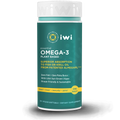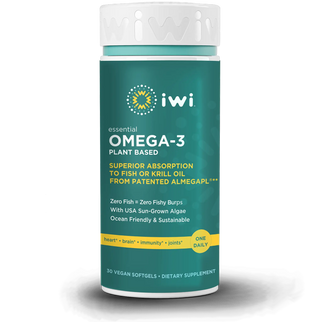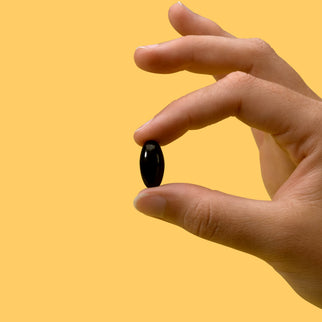A supplement that can support your heart health sounds great, but it’s less exciting if it starts to interfere with some of your other natural bodily functions.
Fish oil can offer a few potential benefits for your health and is often advertised as promoting healthy cholesterol levels and blood pressure. However, it isn’t all sunshine and rainbows with fish oil, as it may have other side effects — one of which might leave you feeling a little uncomfortable. In uncovering the truth about fish oil and constipation, we’ll help you decide if fish oil is right for you and what your other options are.
What Is Fish Oil?

You can probably put the pieces together here, but we’ll provide you with a little more of an in-depth picture. Fish oil comes from the tissues of fatty, oily fish. The fish most commonly included in fish oil are fatty fish like mackerel, salmon, sardines, and tuna.
You can take fish oil either in a capsule or by a spoonful of the oil itself. Taking fish oil is a convenient alternative to eating fish, as consuming two servings of fatty, oily fish a week is said to support heart health. Fish oil provides a source of a healthy fat called omega-3 fatty acids, which we’ll dive into next.
What Are Omega-3 Fatty Acids?
Omega-3 fatty acids are a type of polyunsaturated fatty acid that can be found in the body. These healthy fats play a helpful role in the body, working to build healthy cells and support positive interactions between cells. In doing so, they help support the healthy function of many systems in the body.
There are three main types of omega-3 fatty acids:
- Alpha-linolenic acid (ALA), an omega-3 precursor
- Docosahexaenoic acid (DHA)
- Eicosapentaenoic acid (EPA)
Many plant foods contain ALA, so it is easier to come by in a standard diet. It is also easier to get, meaning fewer people have to stress about obtaining enough of this nutrient in their diets. However, DHA and EPA offer more potential health benefits than ALA — but they’re also found in fewer foods. This is where fish oil comes in.
Why Take Fish Oil?
Fish oil offers many potential health benefits, which is a key reason why it has skyrocketed into popularity as a supplement over the past few years. Fish oil is special because it contains the two most beneficial essential omega-3 fatty acids — DHA and EPA.
Not only does it contain these two omega-3s, but fish oil stands out because these two nutrients are hard to find elsewhere.
Some of the many potential benefits of these two omega-3s include:
- Supporting healthy cognitive function
- Supporting joint health
- Maintaining overall emotional wellness
- Supporting healthy growth and development
It is important to note that the benefits of fish oil come not from the fish oil itself but from the fact that they contain omega-3 fatty acids. Fish oil just happens to be one of the few — but not only — sources of DHA and EPA omega-3 fatty acids.
Some researchers suggest that the average adult should obtain between 400 and 500 mg of combined EPA and DHA per week. Many fish oil supplements provide about 300-1000 mg of these two nutrients in each capsule.
Does Fish Oil Cause Constipation?
Some say fish oil causes constipation, while others insist that this is a myth. The answer isn’t exactly simple, but we can provide some insight by breaking down the facts.
Despite this reputation that fish oil has developed, other ideas point to the fact that fish oil may actually promote better digestion. Some studies have suggested that omega-3 fatty acids may act as a prebiotic and support the health of the bacteria that live inside your gut. Your gut is full of billions of bacteria that help you break down food and use the nutrients inside of it.
By promoting a healthy microbiome in your gut and supporting the bacteria inside it, the omega-3s in fish oil may make the supplement a good option for people with digestive concerns. However, this link still needs more research to determine the full picture of how omega-3s affect your bathroom habits.
On the other side, there may be some merit to the idea that fish oil causes constipation. One of the listed side effects of ethyl esters, a type of medication that uses fish oil-derived omega-3s, is constipation. Again, it is not 100% clear whether the side effect is because of fish oil or another ingredient inside the medication. At the same time, much of the evidence that fish oil causes constipation is anecdotal instead of research-based.
At the end of the day, the notion that fish oil and constipation go hand-in-hand may not be a matter of fact. Still, as discussed above, the benefits come largely from the omega-3 content in the fish oil. That said, you don’t have to consume your omega-3s from fish oil.
Of course, the decision is up to you, but before you commit to taking fish oil supplements, you should weigh the other potential adverse effects.
What Are the Other Side Effects of Fish Oil?
Fish oil does not cause many extremely dangerous side effects, but these can be enough for some people to say “no thank you” to the popular supplement. Most of the side effects of fish oil lead to discomfort more than serious problems.
For example, common side effects of fish oil include:
- Heartburn
- Indigestion
- Fishy burps or breath
- Nausea
However, you should still take care and precaution when consuming fish oil regularly. Otherwise, the potential side effects could be more serious.
Another risk of fish oil is that many people have seafood allergies and cannot consume fish in any form. If you have had questionable reactions to eating fish or seafood, consult a medical professional before you consider taking fish oil as a supplement.
Altogether, the side effects of fish oil are not extremely serious for everyone, but they might be uncomfortable enough to consider an alternative.
Are There Alternatives to Fish Oil?

The benefits of fish oil sound great — who wouldn’t want to support heart health? However, there are still several drawbacks that can come with the benefits. It would be amazing to just be able to turn to an option that offers the pros without the cons — fortunately, there is one, and it’s a small green marine plant.
Like fish oil, algae oil provides both DHA and EPA omega-3 fatty acids responsible for many potential health benefits. However, algae offers far more advantages. For example, it is completely plant-based, so algae supplements are a perfect option for anyone, regardless of their diet, lifestyle, or potential allergens. Algae also has no fishy aftertaste, so you can take a supplement like iwi life omega-3 without the unpleasant fishy burps.
Even more, algae has no known allergies, and does not produce allergic reactions in the population sensitive to seafood, since algae falls into a different category.
You also enjoy a higher bioavailability of omega-3s from algae, meaning that your body is able to absorb the nutrients and put them to use more quickly. The omega-3s in algae are absorbed by the body 1.7x better than those in fish oil, giving you more power in every capsule.
Since iwi lifealgae is produced in ponds of water in the middle of the desert, it is also free of harmful toxins or marine contaminants. If that’s not enough, this production process means algae-based omega-3 supplements are also better for the environment, making them the all-around better option.
Fish Oil Benefits Without the Fish
The link between fish oil and constipation isn’t entirely clear, but there isn’t strong scientific evidence to say that it is definite. In addition to the potential for constipation, fish oil may also lead to the discomfort of indigestion, nausea, or unpleasant fishy burps. Given all the potential drawbacks, there might not be enough reason to risk testing the claim for yourself, especially when there is a better option, like iwi life.
When you turn to iwi life algae-basedomega-3 supplements to get your omega-3s, you can enjoy the benefits of these healthy fats without the question marks. Whether fish oil causes constipation or not, you know that algae supplements can provide you with the same potential health benefits as fish oil without all the potential drawbacks.
Besides, algae provides enough of its own advantages to leave fish oil in the past regardless. Check out the complete family of iwi life products to see all the ways that algae can support your health and wellness.
Sources:
Essential Fatty Acids | Linus Pauling Institute
Impact of Omega-3 Fatty Acids on the Gut Microbiota | PMC


















